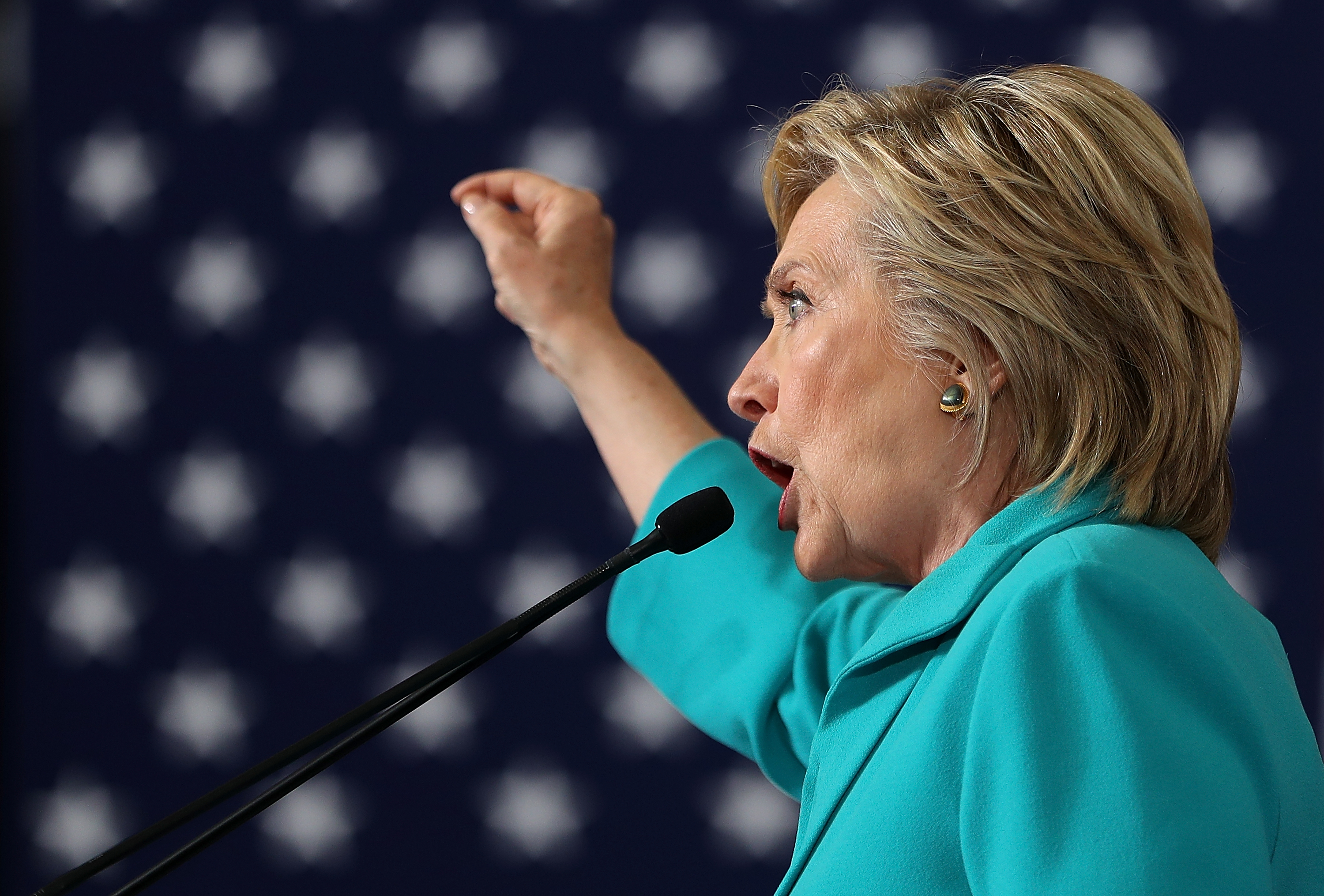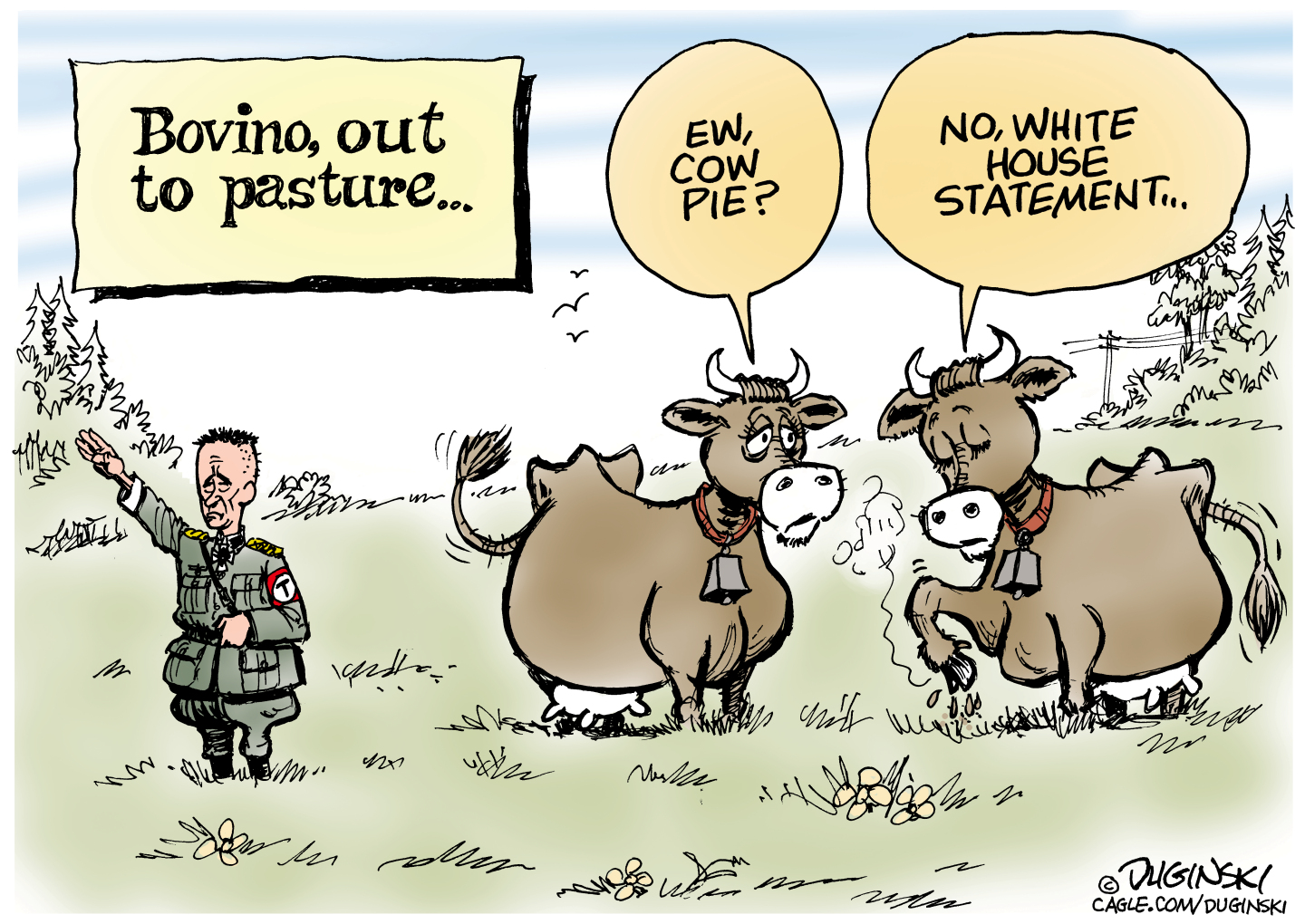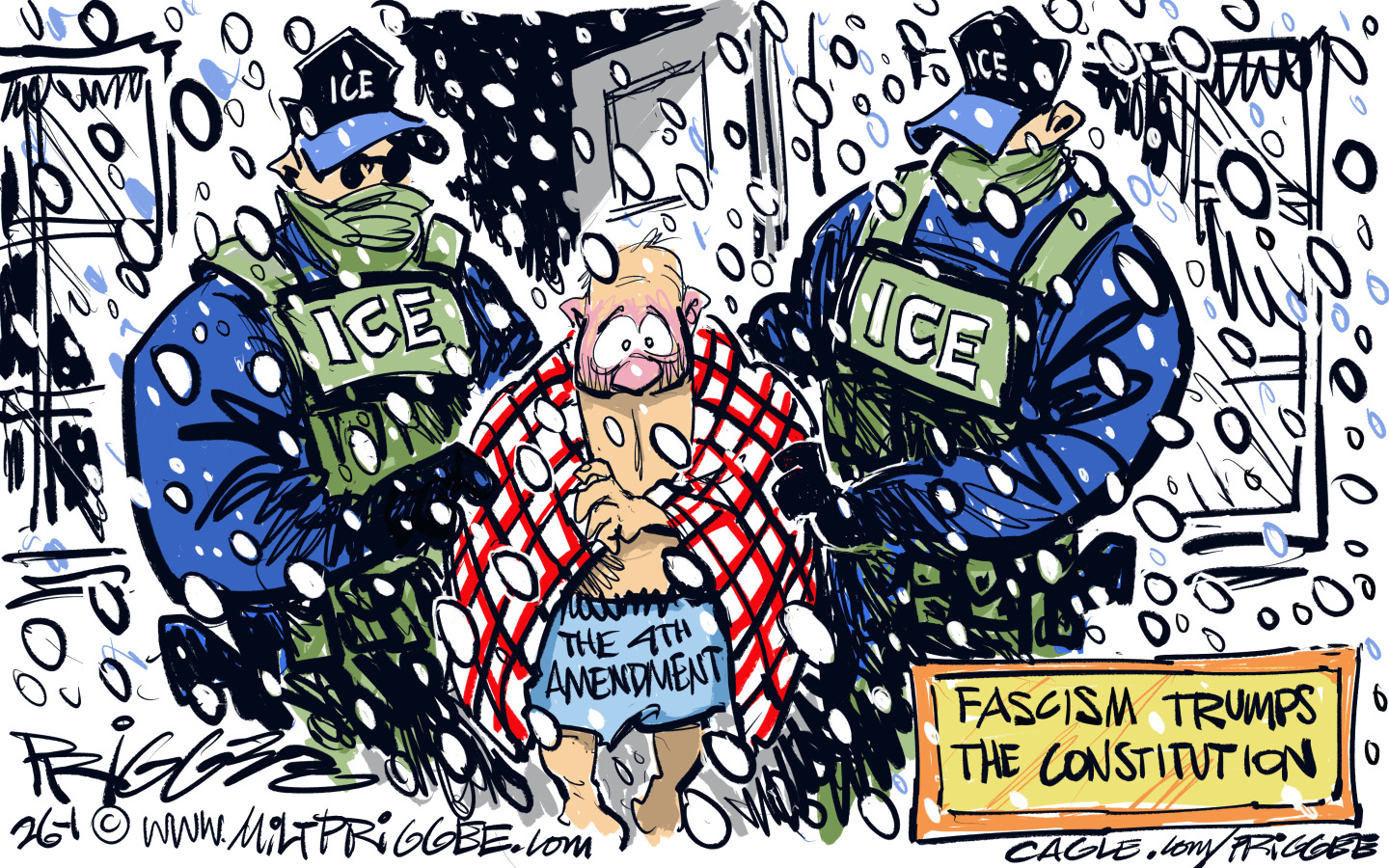Can Hillary Clinton convince the Republican Party that Donald Trump is a racist?
Some progressives wanted her to attack the Republican Party in her Thursday speech. She embraced it.


Donald Trump is not a subtle man. So when he set about to win the Republican nomination for president, he identified the most potent force within the GOP — not just anger at Washington, but anger at a changing America that gives many white people the feeling that they've been left behind — and gave it a gigantic hug. To be honest, I have no idea whether at that time Trump understood how he would be embraced by America's radical right. Something tells me that he doesn't have a particularly nuanced understanding of the ideological cross-currents of American politics, and what the implications are when you step from one to another. But as the campaign went on, he nurtured a relationship with the rightist fringe, perhaps not understanding just where it would leave him with voters.
And now, Hillary Clinton is trying to make sure that Trump pays a price not just for what he has said, but who's supporting him. She put out a web video with KKK members and other white nationalists praising Trump, then gave a speech in Reno on Thursday arguing that Trump is "taking hate groups mainstream and helping a radical fringe take over one of America's two major political parties."
The particulars may not be all that new, but it's the first time Clinton has devoted an entire speech to this critique. And the political context is that Clinton is almost where she needs to be in order to win; polls put her support at or just below 50 percent. Trump, on the other hand, trails her by somewhere between 7 and 10 points, and in order for him to pull even he needs to win over Republican moderates and independents, particularly women.
The Week
Escape your echo chamber. Get the facts behind the news, plus analysis from multiple perspectives.

Sign up for The Week's Free Newsletters
From our morning news briefing to a weekly Good News Newsletter, get the best of The Week delivered directly to your inbox.
From our morning news briefing to a weekly Good News Newsletter, get the best of The Week delivered directly to your inbox.
That's a big part of the reason Trump is now "reaching out" to minority groups and flailing about on immigration in an apparent attempt to "soften" his views. If he can't persuade those few undecided voters, he simply can't win.
So to stop that, Clinton presented a stinging indictment not only of the things Trump himself has said and done — charges of discrimination in his businesses, his efforts to prove that Barack Obama isn't an American citizen, his assertion that Mexicans are rapists and criminals, his proposed ban on Muslims entering the country, and so on — but also of who's surrounding him and supporting him.
She described the "alt-right" white nationalist movement — a racist, sexist, anti-Semitic fringe that sees destroying mainstream conservatism as one of its primary goals — and argued that it has essentially taken over the GOP, particularly with Trump's hiring of Stephen Bannon of Breitbart News to be CEO of his campaign. And she made an explicit appeal to Republicans to see Trump as a betrayal of their party's traditions:
This is a moment of reckoning for every Republican dismayed that the party of Lincoln has become the party of Trump. It's a moment of reckoning for all of us who love our country and believe that America is better than this.Twenty years ago, when Bob Dole accepted the Republican nomination, he pointed to the exits and told any racists in the party to get out.The week after 9/11, George W. Bush went to a mosque and declared for everyone to hear that Muslims "love America just as much as I do."In 2008, John McCain told his own supporters they were wrong about the man he was trying to defeat. Senator McCain made sure they knew — Barack Obama is an American citizen and "a decent person."We need that kind of leadership again. [Hillary Clinton]
There are some progressives who believe that this is the wrong approach to take, that instead of characterizing Trump as an aberration who stands apart from the Republican Party, Clinton should make the case that Trump is the purest expression of Republican ideology and tactics, the logical end point of everything they've been doing for half a century. And there's a strong case to be made there. After all, it isn't as though Trump is the first Republican who realized you could mine racial prejudice and white resentment for votes. Nixon did it, Reagan did it, George H.W. Bush did it (surely you remember Willie Horton), and Republicans at all levels have done it for decades.
A free daily email with the biggest news stories of the day – and the best features from TheWeek.com
The difference is that the racial appeal is usually made with at least a veneer of plausible deniability. Trump has no time for that; indeed, the fact that he didn't pussyfoot around when it came to stoking xenophobia and bigotry is a big part of why he won the Republican nomination. While the other candidates were exercising care and caution, he'd come right out and say what so many Republican voters were thinking, to their unending delight.
And that's what makes the alt-right so enthusiastic about him as well. He doesn't just say things they like; with his proud declaration that any despicable pronouncement can be justified as a blow against "political correctness," he reinforces not just their beliefs but their rhetorical style of insult and provocation.
There's another reason the alt-right is so attracted to Trump: Anxious masculinity is as central to their worldview as it is to his campaign. Among the alt-right, the most common insult to throw at someone is to call them a "cuck," a word taken from "cuckold," or a man whose wife has humiliated him by cheating on him (mainstream conservatives are called "cuckservatives"). They find much to admire in Trump's procession of ever-younger wives, his desperate assurances that his body parts are adequately sized, and the atmosphere at his rallies, where T-shirts with "Hillary sucks, but not like Monica" on one side and "Trump that bitch" on the other abound.
So is Clinton correct that Trump has mainstreamed the extremism of the alt-right? There are two ways to think about it.
One is that he didn't need to: Not only has the GOP been the party of white people for some time now, but it has gotten worse during the Obama years. Throughout that time, prominent conservative media figures like Rush Limbaugh and Bill O'Reilly have race-baited their audiences into viewing white people as under constant assault from this president, who is supposedly waging a campaign of racial vengeance against them. Conservative House Republicans killed immigration reform before Trump was a candidate. They've waged endless war on the voting rights of minorities. Republicans have long played footsie with extreme figures on the right and used bigotry to whatever advantage they could.
The other way to look at it is that while all that's true, Trump represents a qualitative change. As he so often does, Trump has taken what was implied and made it literal, and in doing so he has given license to so many to give voice to their ugliest impulses. As Clinton said in her speech, we've heard reports of a "Trump effect," in which people are expressing bigoted sentiments out loud that they used to be too ashamed to admit to publicly. We don't know how widespread that is; at the moment all we have are anecdotes.
But the answer may lie in what happens after Trump. If he loses, does the Republican Party revisit the idea of opening itself to minority groups in hopes of one day winning the White House? Or will Trumpism remain the dominant force within the GOP, shaping its approach to campaigns and governing, just waiting for a more skilled candidate to exploit it?
It will be some time before we know for sure, but for the moment, Clinton's attack on Trump could persuade more than a few Republicans that they can reject him, then return to their party once it has purged itself of his influence. But that will be no easy task.
Paul Waldman is a senior writer with The American Prospect magazine and a blogger for The Washington Post. His writing has appeared in dozens of newspapers, magazines, and web sites, and he is the author or co-author of four books on media and politics.
-
 5 redundant cartoons about Greg Bovino's walking papers
5 redundant cartoons about Greg Bovino's walking papersCartoons Artists take on Bovino versus bovine, a new job description, and more
-
 31 political cartoons for January 2026
31 political cartoons for January 2026Cartoons Editorial cartoonists take on Donald Trump, ICE, the World Economic Forum in Davos, Greenland and more
-
 Political cartoons for January 31
Political cartoons for January 31Cartoons Saturday's political cartoons include congressional spin, Obamacare subsidies, and more
-
 The billionaires’ wealth tax: a catastrophe for California?
The billionaires’ wealth tax: a catastrophe for California?Talking Point Peter Thiel and Larry Page preparing to change state residency
-
 Bari Weiss’ ‘60 Minutes’ scandal is about more than one report
Bari Weiss’ ‘60 Minutes’ scandal is about more than one reportIN THE SPOTLIGHT By blocking an approved segment on a controversial prison holding US deportees in El Salvador, the editor-in-chief of CBS News has become the main story
-
 Has Zohran Mamdani shown the Democrats how to win again?
Has Zohran Mamdani shown the Democrats how to win again?Today’s Big Question New York City mayoral election touted as victory for left-wing populists but moderate centrist wins elsewhere present more complex path for Democratic Party
-
 Millions turn out for anti-Trump ‘No Kings’ rallies
Millions turn out for anti-Trump ‘No Kings’ ralliesSpeed Read An estimated 7 million people participated, 2 million more than at the first ‘No Kings’ protest in June
-
 Ghislaine Maxwell: angling for a Trump pardon
Ghislaine Maxwell: angling for a Trump pardonTalking Point Convicted sex trafficker's testimony could shed new light on president's links to Jeffrey Epstein
-
 The last words and final moments of 40 presidents
The last words and final moments of 40 presidentsThe Explainer Some are eloquent quotes worthy of the holders of the highest office in the nation, and others... aren't
-
 The JFK files: the truth at last?
The JFK files: the truth at last?In The Spotlight More than 64,000 previously classified documents relating the 1963 assassination of John F. Kennedy have been released by the Trump administration
-
 'Seriously, not literally': how should the world take Donald Trump?
'Seriously, not literally': how should the world take Donald Trump?Today's big question White House rhetoric and reality look likely to become increasingly blurred
